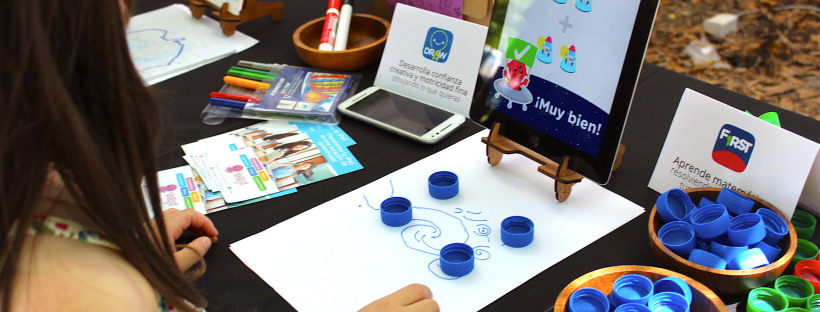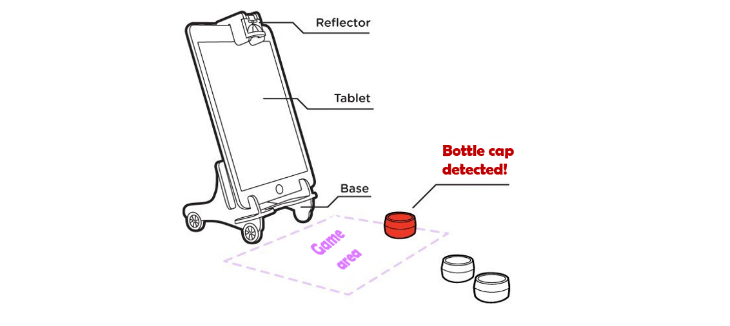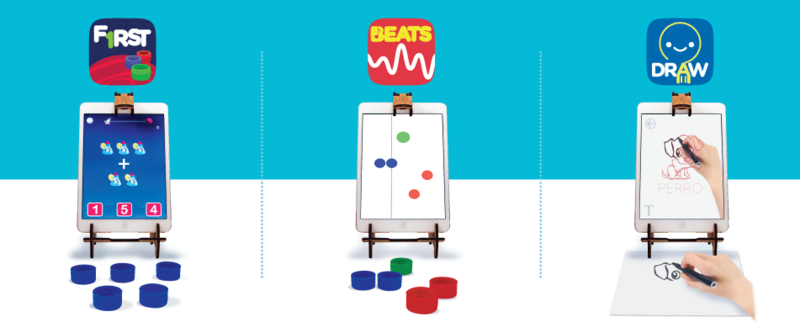Resource:Tullpi: The magic of bottle caps
Contents
What is it?
It is a game for tablets which aims to help kids understand and learn math, music and linguistic concepts in a wholesome way. It transforms abstract concepts like maths in experiments so kids solve mathematical challenges interactively.
How does it work?
Tullpi works by combining the app with the ipad kit, whose price is 50$. In this way, an interactive connection between abstract and real world objects is made through symbols and ideas.
How did the idea came up?
The idea was born when the founder’s little sister received a tablet for christmas and he was astonished by the lack of educational games. Both of his parents are pedagogues and with their help they started thinking about how to solve this problem. The concept behind the idea was that kids need physical interaction to enable reflection about what they want to achieve.
Why is it different?
Unlike other movements with educational purposes, they specifically focus in the context of Latin America. For example, in the US, 40% of the tablets are iPads. However, this ratio barely reaches 1% in the context of Latin America. Having this focus, they’ve moved to Brazil to gain competitive advantages. In this pivoting opportunity they now face a much bigger target audience by working with organizations related to education which are in charge of school groups in India which involve about two million students. A reference in the US is Osmo, providing a new tool for class rather than just a purposeless game. This focus in the emerging markets has a huge potential due to the large number of countries with the need and the way they solve this problem.
Does it work?
Tullpi proved to improve students performance in math by 7-12% in the MABA program. However, the most important impact for the founder is the feedback and reactions from parents about how their kids progress. For example, having helped an autistic kid learn basics math by using Tullpi an hour a day after having struggled years in normal therapies and learning methods is really motivating and this type of scenarios become the main motivation to keep working in the project.
What does the founder believe is the biggest problem?
The biggest problem in the process of launching a SUP in Perú is to get people who are capable enough to add value in a specific role for the company and at the same time are willing to accept low salaries and the financial risks of getting involved in these kinds of projects. The people with the biggest potential have it easy if they work for an old-fashioned company in terms of risk, which is low; and salaries, which are stable and high. Our culture isn’t ready to change value and learning for money. We live in a culture of immediacy in which most of the people want the money now and don’t make decisions with a long-term vision.
Progress is being shown to improve the culture of innovation and entrepreneurship in Perú. Investment has been increasing in the past few years, but society as a group lacks understanding of the true expectations of SUPs. It’s hard to convince people to support a type of company that takes 4.1 times longer (thus 4.1x investment) to be successful.
What does he think about entrepreneurship in Peru?
It’s really important to have exits and successful examples. These would serve as role models and are sprouts of talent. These examples will be seen as accessible and familiar and will consequently motivate people to follow similar behaviors which will keep building up a helpful environment. At the same time, the first generation of exits can become angel investors with long term vision who are key to the system and launch-off this cycle of entrepreneur → angel investor.
Changing the mindset of the ones who have the capital to invest in these projects is a true challenge in Latin America.
What is Tullpi's goal?
In the long-term, Tullpi aims to have tools that foster learning for al primary school education as a whole, including fields of music and arts.
Recomendations for startups
It’s key to maintain the team as small as possible. The founder has hired 15 people and fired 12 of those already. SUPs need to pivot all the time until finding the right path. Even though if you find it, hiring should be one of the last priorities prior to scaling up after validating an MVP. The bigger the team is the more difficult it is to pivot. People aren’t used to trash out work they’ve done for the past months and sometimes doing this is necessary.
Written by
By:Ariane Ernandorena, Camila Maura, Diego Muñoz & Gonzalo Vidaurrazaga.



